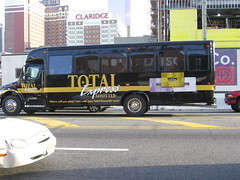 Image by iirraa via Flickr
Image by iirraa via Flickr
The Cap'n Transit blog has an entry on how New York is proposing allowing private vans to replace service abandoned by the budget cuts the MTA in the New York area.
Setting the "livery vans" up for failure?
In the posting it talks about while the city is talking about allowing the vans, on the other hand it is making the options so restrictive that it would almost be fool hardy for any van operator to actually try to make a goal of it.
The question is, would these kind of vans be successful in other areas?
While some people complain how much service has been cut in the area, in reality few places have actually lost service. Some areas have seen cutbacks but that is mostly due to them being far flung suburban areas that do not support regular transit service.
While I support private enterprise, it would be difficult for a private van to make money operating in these areas. However, how about service to such destinations as Hoogle Zoo where UTA service is virtually non-existent? While the vans might duplicate UTA service in places, not enough to do harm to either.
However, the danger is what many anti-transit folks propose. That is having vans directly compete against the UTA on its best routes. In this case the vans would cherry pick the best routes harming both operations. Complementary service would be a benefit to all those using it but cherry picking could lead to cut throat operations that will harm not only the operators but the customers as well.
Questions would also have to be answered on how these vans would be regulated so that they provide safe operations. Often times the biggest complaint about Jitneys is poor maintenance of their vehicles and the quality of drivers.
This could be an option worth exploring so long as transit service is improved and not damaged in the long run.

1 comment:
This is one of the problems with private operations of transit in the modern era.
1. Automobiles are subsidized to a massive extent by overing the roadways. Transit is too, but without the at use expense transit doesn't have a fair playing field at all, with roadways truly amounting to about 50% of actual automobile use.
2. Most restrictions laws, and cities would not even allow truly economical and environmentally friendly transit services such as streetcars, trolleys, or other infrastructure intensive services.
3. Many cities (such as Seattle and Portland) actually have right of refusal to most private operators (as NY does too) and wouldn't allow them to provide real competition against transit services or otherwise. Transit service is one of those things that can fend for itself no matter what under the current laws, rgulations, and other restrictions. When considering private transport as transit, it truly is a sad state of affairs.
Post a Comment